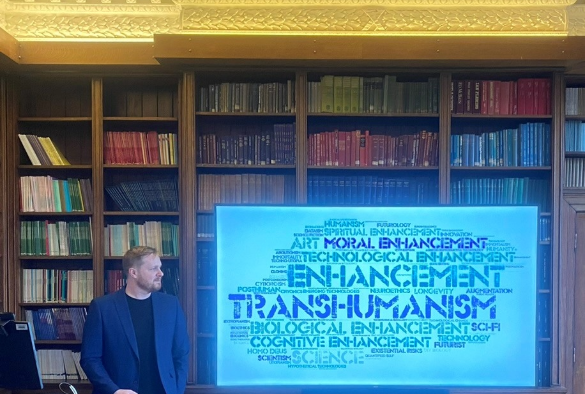
Liam Shore is a third-year researcher at the University of Liverpool, in the Department of Philosophy. His research interests fall within the domain of ethics, notably on the ethics of digital and biotechnologies.
The Making of a Philosopher
I’m a philosopher, but I haven’t always been one, so how does someone become a philosopher? And more fundamentally, why would anyone want to become one?
As a rare vocation, you’d be forgiven for supposing that philosophers are an extinct species who once roamed the Athenian plazas during early antiquity, gesticulating poignantly and wearing togas. Well, happily they do exist today, sans the togas, largely unnoticed, behind the scenes on ethics boards, or engaging in fundamental first-principles critiques of….well….everything.
A question arises: if philosophers’ critique ‘everything’, how do they develop knowledge to criticise specialist areas? This becomes particularly poignant in an applied ethics context. My own personal journey, from Technologist to Philosopher, shows that one practically needs to be educated in two disciplines to become a bona fide philosopher.
When deciding what subjects to study, and what career to pursue, I was torn between multiple strong interests. In third place, Technology; in second place, Medicine; and in first place, Philosophy. In my case, I took the reverse path toward becoming a philosopher. Namely, I studied technology, worked in the biological sciences industry, and returned to academia with domain-specific expertise to enter into the philosophy sub-field of ethics. The beauty of philosophy for me, and the reason why I personally had the desire to pursue becoming a philosopher, is that philosophy, being able to critique everything, can powerfully converge disparate interests. It is this quality that made philosophy my first love, and so my PhD journey began, delving into the ethics of radical life
extension.
Understanding Rejuvenation Biotechnologies
Recently, breakthroughs in rejuvenation biotechnologies, particularly those of the Strategies for Engineered Negligible Senescence (SENS) variant, have garnered little attention, and yet constitute steps towards a paradigm-altering event. SENS therapies, like maintaining classic cars to prolong their lifespan, seeks to do the same for our bodies as we age. SENS suggests that ageing is caused by the accumulation of cellular and molecular damage throughout the body over time, and advocates posit that by repairing or reversing this damage, it is possible to rejuvenate tissues and organs, thereby extending a person’s healthy lifespan. Ultimately, by seeking to tackle age-related diseases at their root, via interventions such as stem cell therapies, the aim is to bring age-related diseases fully under comprehensive medical control. Overall, the eventual aim of SENS is to combine a panel of these therapies to combat all preceding causes of age-related diseases, and consequently, tackle ageing itself!
Although this sounds futuristic, there are therapies in various stages of development, with the furthest along being in clinical trials. Advocates claim that these therapies could, in due course, function well enough to rejuvenate a person’s body to a youthful state. In effect, this is a process that, amongst other things, removes damage and replaces cells, enabling the body to regain a healthy condition. The outcome of extending good health is that it prolongs life, as it postpones the onset of age-related diseases until higher chronological ages. Accordingly, if someone repeatedly receives these therapies throughout life, this could constitute a potentially radical life-extending situation, as periods of poor health may be postponed repeatedly, allowing one to maintain optimal physiological functioning for longer, thereby delaying death itself!
A Case for Philosophical Inquiry
The SENS approach to rejuvenation biotechnologies represents a bold vision for extending healthy lifespans and combating age-related diseases. However, realising this vision requires careful consideration of the ethical implications of extending human lifespan, making the SENS approach a question for philosophical research.
The most common ethical concerns for life-extending technologies are Health Equity i.e. fairness in health opportunities for all; Longevity/Population Dynamics i.e. understanding how long people live & how populations change; Environmental Impacts i.e. the effects of human activities on nature and Informed Consent/Autonomy i.e. respecting people’s right to make their own decisions.
Nevertheless, although important, these concerns don’t engage with how this technology impacts what we find meaningful at the profoundest level as human beings. However, my research incorporates all the aforementioned ethical concerns and delves deeper into the realms of identity, purpose, and meaning in life, primarily through an existentialist lens.
Existentialism, as a philosophical theory, concerns itself with questions of: the nature of individual existence, authenticity of self, human freedom, and the search for purpose/meaning in life. It is via this prism that I’m currently defining a taxonomy of values supported by radical life extension advocates, with this taxonomy categorising virtues like fairness, compassion, and autonomy, providing a structured framework for ethical analysis. In addition, I’m exploring how a SENS-induced radically extended life may impact what we value. And next, I plan to explore whether the consequences of SENS therapies could result in mental ageing, in essence a feeling of listlessness, a sense of ennui, or a notion of world-weariness.
Overall, I hope that my research will deliver original insights to help us work towards a future where radically extended healthspans are possible, while fully prioritising and ensuring human well-being.